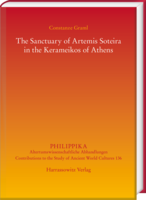|
|
more titles of the subject:
Download:
Please note: With adding digital Products to your cart
the payment will be handled via PayPal. The download will be provided after the payment is confirmed. In 1890, a newly discovered sanctuary was excavated in the necropolis on the famous Kerameikos of Athens. Guided by the ancient written sources and the expectations of his day, the excavator Kyriakos Mylonas interpreted the precinct as an Imperial Roman sanctuary of the goddess Hekate. In ancient texts, this deity is commonly associated with magical rituals and binding spells, and lead tablets used for such purposes have been found in graves all over the Greek world, including those of the Kerameikos necropolis. Due to the location of the sanctuary among the tombs and Mylonas’ interpretation of the site as belonging to this striking deity, researchers came to treat it as an unambiguously attested cult place of Hekate, even though the archaeological discoveries had not yet been fully published.
This volume is dedicated to this task. By conducting an in-depth analysis of the site’s entangled excavation and research history together with a new investigation of the actual archaeological findings, Constanze Graml not only re-dates the district to the Hellenistic period, but also reassigns it to the goddess Artemis Soteira. Based on these results, the sanctuary’s embedding and role in the cult topography of Athens and Attica can finally be seen in new light. |
|||||||||||||||||||||||||||||||||||||||






